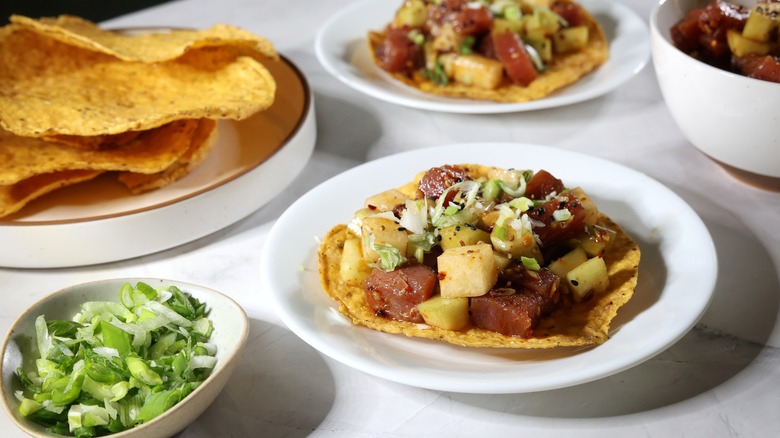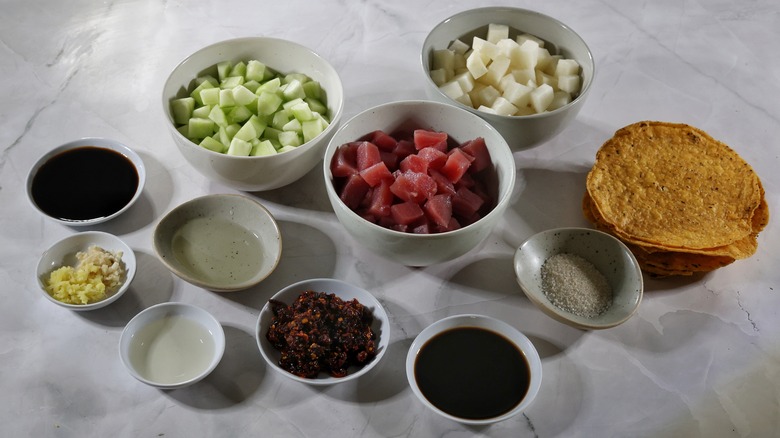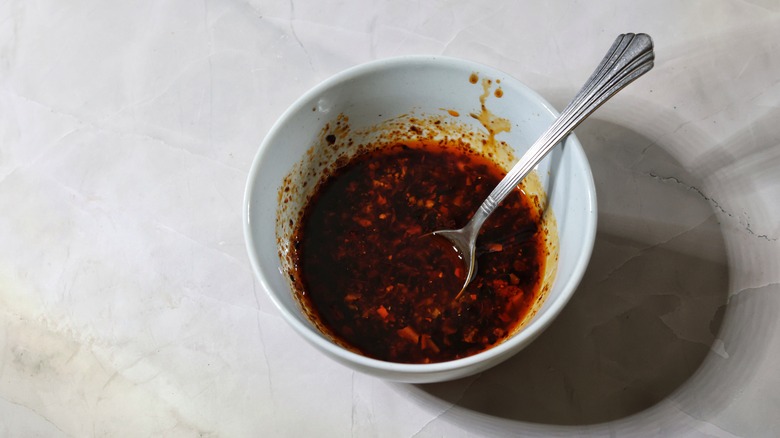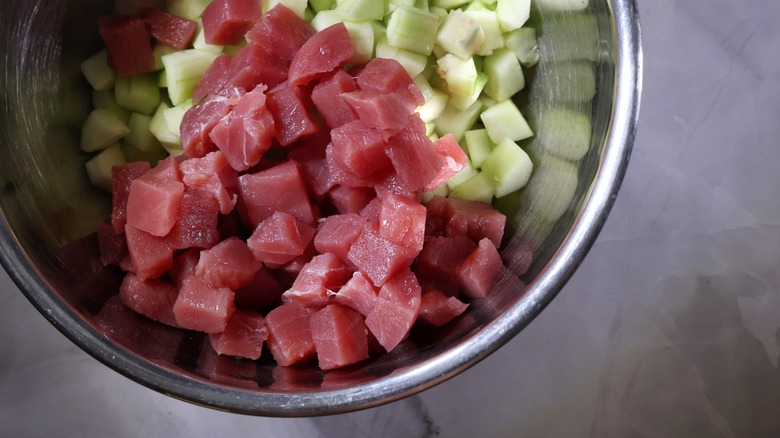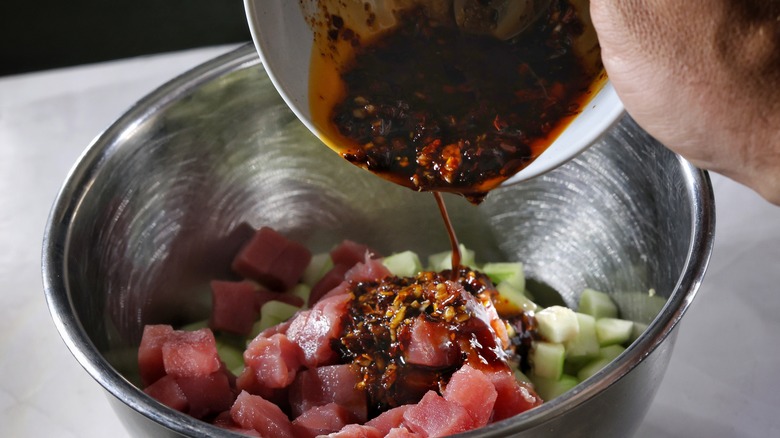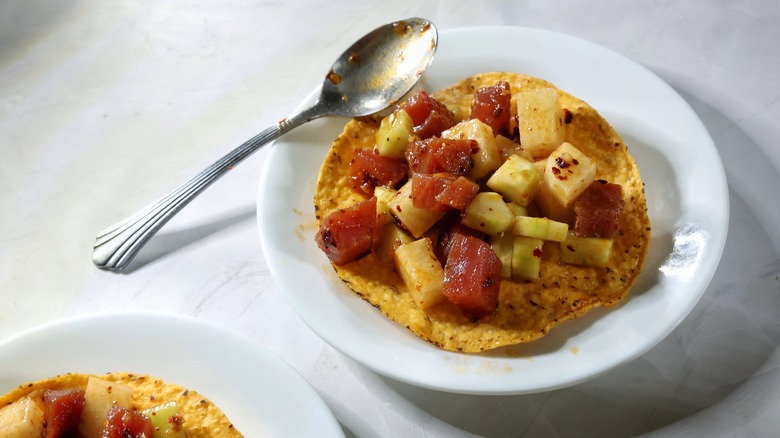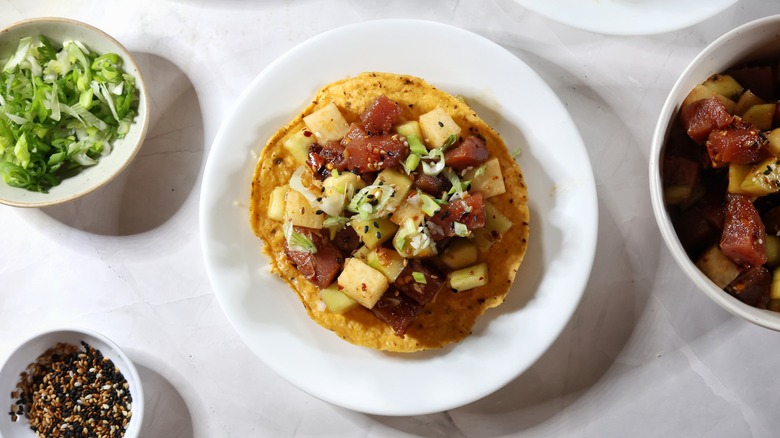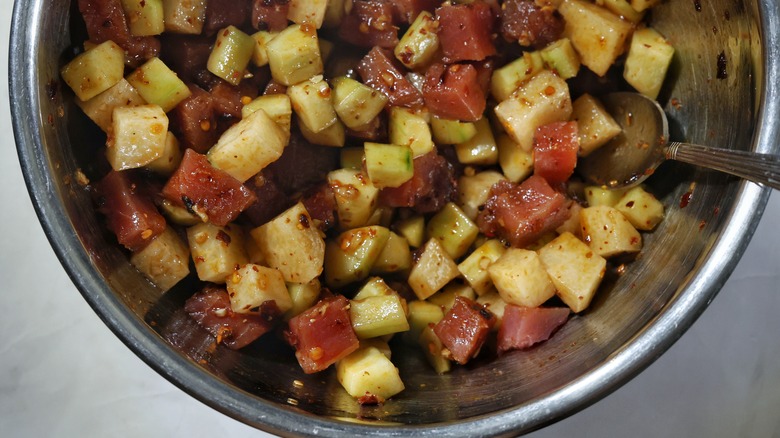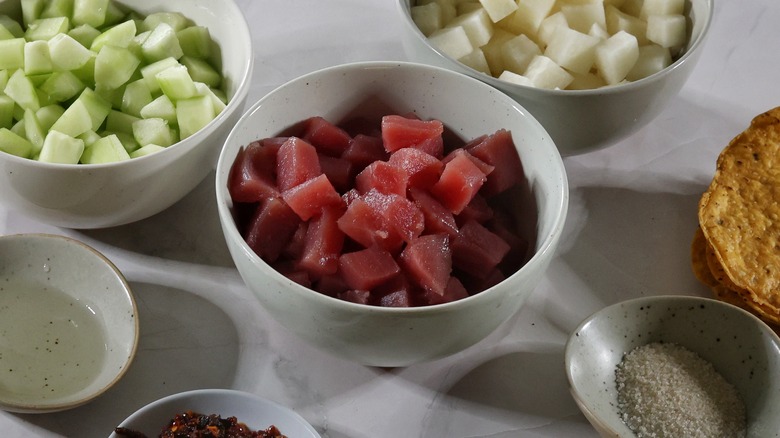Sichuan-Inspired Tuna Tostadas Recipe
With a plethora of delicious flavors and delightful textures, these tuna tostadas bring the cuisines of Mexico and China together in a single dish that would fit equally well on a sun-dappled Baja beach or a bustling Chengdu market. The base of the dish is a simple tostada, a crisp disc of corn which makes a perfect platter on which to serve a mixture of buttery ahi tuna, crisp cucumber, and crunchy jicama, all tossed in a sauce perfumed with the aromas of soy sauce, ginger, garlic, Chinese black vinegar, chiles, and Sichuan pepper.
It is hard to imagine that a recipe which takes only 15 minutes from refrigerator to dinner table can create such a stunning dish, but the carefully selected ingredients in this recipe allow you to wow your guests with very little time spent in the kitchen. A big part of the convenience of this dish is that there isn't any cooking involved — just a little mixing, tossing, and adorning going on here. Perfect for a light lunch, an elegant appetizer, or a happy hour nibble, these tostadas are sure to be a hit.
Gather the tuna tostada ingredients
For this recipe you will need tostadas, sushi-grade tuna, cucumber, and jicama. These ingredients make up the bulk of the meal, but they need a delicious sauce. For the sauce you will need soy sauce, sugar, garlic, ginger, vegetable oil, chili crisp, rice vinegar, and Chinese black vinegar. Once you have brought together these ingredients, you are ready to start prepping (and only 15 minutes away from eating!).
Step 1: Make the sauce
Combine the soy sauce, sugar, garlic, ginger, vegetable oil, chili crisp, rice vinegar, and Chinese black vinegar in a small bowl. Stir until the sugar dissolves.
Step 2: Prep the tostada toppings
Add the tuna, jicama, and cucumber to a mixing bowl.
Step 3: Add the sauce
Pour over the sauce and mix well.
Step 4: Top the tostadas
Spoon the tuna mixture over the tostadas.
Sep 5: Garnish and serve
Serve immediately, garnished with thinly sliced scallions and toasted sesame seeds, if desired.
What can I substitute for Chinese black vinegar?
Chinese black vinegar is a certain type of vinegar in that it's made primarily from rice, but sometimes, depending on location, may also include other grains such as sorghum, wheat, or millet. It is heavily aged, lending it the dark hue as well as its smoky, aromatic, slightly sweet, and umami-tinged flavor. Black vinegar is unique because, during fermentation, the Maillard reaction occurs, which is what gives it that dark, deep black hue. Though other vinegars simply can't compare in the licorice-forward flavor depth that Chinese black vinegar provides, you can use other varieties in a pinch if you don't happen to have it stocked in your pantry.
Rice vinegar makes a good substitute for black vinegar, though keep in mind that it is slightly more acidic. Balsamic vinegar also works, with its rich and sweet flavor making it a pretty good alternative to Chinese black vinegar. Balsamic vinegar does come in many forms however, and it is important to choose one of the younger varieties. The longer the balsamic is aged, the thicker and more syrupy it becomes. When substituting balsamic from black vinegar, stick to condiment or commercial-grade for the best results.
What makes fish sushi-grade?
When it comes to eating raw meat of any kind, there can be a certain amount of trepidation, and it is important to make sure you are selecting a safe, high-quality product. Fish is consumed raw more often than other meats, and it is not uncommon to see fish referred to as sushi-grade, meaning that it is intended to be eaten raw. But what are the actual criteria for fish to be labeled as "sushi-grade"?
As it turns out, sushi-grade is mostly a marketing term. In fact, the only real standard for such fish is that it be frozen before consumption, which would kill any parasites that cooking with heat typically would. It's a good idea to look out for tuna that has a "flash-frozen" label on it, which means that the fish was frozen very shortly after it was caught. While sushi-grade may be somewhat of an arbitrary term, the label is typically indicative of a higher-quality product. Fish designated for raw consumption are likely to be well-sourced, carefully handled, flash frozen shortly after being caught, and ideal in flavor and texture to be eaten raw. There are no guarantees attached to that label, but if you are going to eat raw fish, it is always better to choose a high-quality product intended for that purpose and, when in doubt, go to a store or fishmonger that you trust.
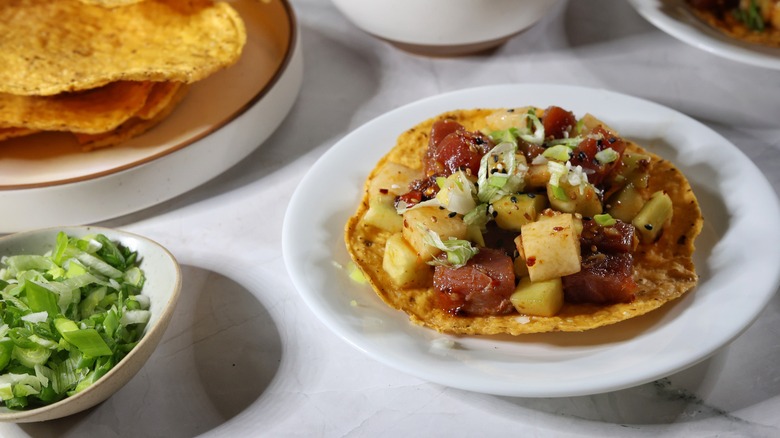
- 1 tablespoon + 1 teaspoon soy sauce
- 1 teaspoon sugar
- 1 teaspoon minced garlic
- 1 teaspoon minced ginger
- 2 teaspoons vegetable oil
- 2 tablespoons chili crisp
- 2 teaspoons rice vinegar
- 2 teaspoons Chinese black vinegar
- 12 ounces sushi-grade tuna, cut in ¾-inch cubes
- ½ medium jicama, peeled and diced
- 1 large cucumber, peeled and diced
- 6 tostadas
- Toasted sesame seeds, for garnish
- Thinly sliced scallions, for garnish
- Combine the soy sauce, sugar, garlic, ginger, vegetable oil, chili crisp, rice vinegar, and Chinese black vinegar in a small bowl. Stir until the sugar dissolves.
- Add the tuna, jicama, and cucumber to a mixing bowl.
- Pour over the sauce and mix well.
- Spoon the tuna mixture over the tostadas.
- Serve immediately, garnished with thinly sliced scallions and toasted sesame seeds, if desired.
| Calories per Serving | 337 |
| Total Fat | 11.8 g |
| Saturated Fat | 5.6 g |
| Trans Fat | 0.0 g |
| Cholesterol | 52.4 mg |
| Total Carbohydrates | 35.2 g |
| Dietary Fiber | 3.2 g |
| Total Sugars | 2.6 g |
| Sodium | 771.4 mg |
| Protein | 24.6 g |
